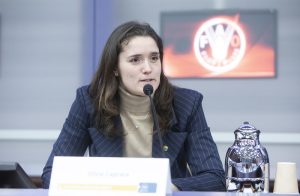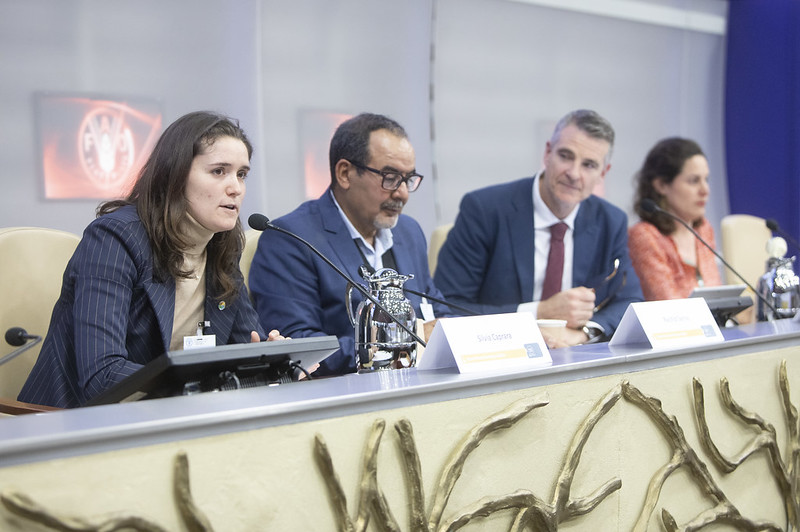On March 26 and 27, Ms Silvia Caprara from Giovani di Confagricoltura – ANGA, a former participant in the WFO Gymnasium Capacity-Building Program and a promising young female farmer leader, represented the World Farmers’ Organisation and the entire Farmers’ Major Group at the Expert Group Meeting on Sustainable Development Goal 2 at the FAO headquarters in Rome, Italy.
Co-organised by the UN Department of Economic and Social Affairs and FAO, the meeting brought together around 50 leading experts, including WFO Board Member Elizabeth Nsimadala, President of the Eastern Africa Farmers Federation (EAFF), to discuss trends, persistent challenges, best practices, and policy recommendations in preparation for the 2024 High-Level Political Forum on Sustainable Development, which will conduct an in-depth review of SDG 2.
Ms Caprara contributed to the “Double Agricultural Productivity and Incomes of Small-scale Food Producers” session, which focused on Target 2.3.

In her address, Ms Caprara underscored the crucial lessons learned from family farmers, especially the youth, in achieving sustainable agricultural productivity and ensuring equitable wealth distribution in the face of global food security challenges. She emphasized the interconnected approach, addressing not only SDG 2 but also SDG 13 and SDG 1, recognizing the essential synergy between eradicating poverty, combating climate change, and ensuring food security for all.
She highlighted that what emerges from the UN Food Systems Summit +2 Stocktaking Moment and the State of Food Security and Nutrition in the World Report 2023 is the urgent need to address the challenges facing food security: “SDG2 target 2.3 emphasises the importance of doubling agricultural productivity and incomes for small-scale farmers, especially given the increasing global population. Farmers are key to achieving Sustainable Global Food and Nutrition Security” – she stated.
As an example of the potential of family farming to drive sustainable agriculture, WFO representative Ms Caprara brought to the audience the best-practice example of her WFO Gymnasium colleague, Ms Evangelista Chekera, a poultry farmer from Zimbabwe Farmers’ Union (ZFU). Facing the challenge of high chick mortality rates in her family poultry business due to a lack of proper equipment and support services, Ms Checkera, instead of giving up, developed a groundbreaking chick-brooding device which significantly reduced chick mortality rates.
This inspiring story of resilience and determination gave Ms Caprara a chance to highlight the importance of innovation and investment in agriculture. However, constraints such as limited resources hinder scaling up such initiatives.
Farmers are actively addressing current challenges to ensure increased production, yet their adaptability can no longer be taken for granted. They are proactively seeking methods to mitigate risks and maintain land productivity. In this pursuit, harnessing technology, innovation, and traditional knowledge is essential, particularly in responding to climate change and enhancing seed and breed quality. Allocating resources to research and development and fostering knowledge-sharing platforms is imperative.
Closing her intervention, Silvia Caprara took inspiration from her experience as a member of the WFO Gymnasium network to advocate for the establishment of forums where farmers, especially young innovators, can exchange best practices: “Participation in this program has enabled me to engage with fellow young farmers and exchange knowledge and best practices, as we are doing now on this panel. However, while knowledge sharing is necessary, it is not sufficient. As evidenced by my colleague Evangelista’s ongoing struggles to scale up her activities due to resource constraints, additional measures are needed. What is necessary is to enhance access to financial services, particularly grants, and to invest in training for farmers, extension services, and the promotion of entrepreneurship and applied research.”
Photo credit: ©FAO/Giulio Napolitano. Editorial use only. Copyright ©FAO
